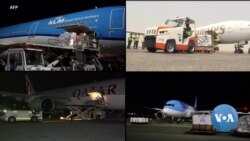In recent weeks, as Africa prepared to mark the milestone of one year since the coronavirus reached its shores, millions of doses of long-awaited vaccine finally began to arrive across the continent. Most were provided by the global COVAX Facility, which distributes vaccine to lower income countries.
That, officials say, has flipped this tale from one of despair to one of optimism.
And, says South African President Cyril Ramaphosa, Africans played a valuable part in turning the tide.
“South Africa's scientists and research institutions have made an important contribution to these efforts and have contributed to global knowledge about the disease, including on the emergence of new variants,” he said this week, addressing his nation on television. “And in this regard, our scientists who we should be proud of, have really led the way and they are recognized globally.”
Ramaphosa, who held the rotating head of the African Union in 2020, was also instrumental in establishing a continental plan to acquire vaccines. He and other African leaders have repeatedly stressed the importance of global vaccine equity and urged access for poorer nations.
In the Democratic Republic of Congo, the largest country in sub-Saharan Africa, officials this month received their first delivery of 1.7 million vaccine doses through COVAX.
Village Reach is an aid organization that focuses on remote, rural low-income countries. Their DRC country director, Freddy Nkosi, told VOA that while African nations appear to have a lower proportion of confirmed COVID-19 cases and deaths, the pandemic has still hit hard here.
“Yes we are as affected as the rest of the world, in different proportion,” he said via Google Hangouts, from Kinshasa. “We have to continue to protect ourselves through all the protective measures, but also we have to get vaccinated so that we are all protected.”
Dr. Richard Lessells, one of South Africa’s top viral researchers, says the continent’s largest vaccine drive, in South Africa, looks promising after fits and starts.
The country was set to distribute 1 million doses of the AstraZeneca vaccine, but reversed course last month after researchers found it to be less effective against a variant that accounts for the majority of the nation’s new cases.
South Africa has since switched to the Pfizer and Johnson & Johnson vaccines, but the process still delayed the vaccination campaign.
Lessells says that as the continent stares down this anniversary, it needs one thing: time.
“Once we get beyond that first priority group of the health care workers and start delivering it to the other vulnerable groups within the population,” he said. “We then get a much better sense of how we're doing here in South Africa.”
So, what is year two of the pandemic going to look like in Africa? On this, everyone seems to agree: hopeful.





